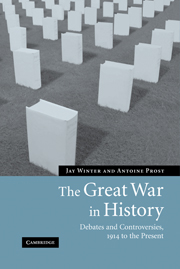Book contents
- Frontmatter
- Contents
- Preface to the English edition
- Introduction
- 1 Three historiographical configurations
- 2 Politicians and diplomats: why war and for what aims?
- 3 Generals and ministers: who commanded and how?
- 4 Soldiers: how did they wage war?
- 5 Businessmen, industrialists, and bankers: how was the economic war waged?
- 6 Workers: did war prevent or provoke revolution?
- 7 Civilians: how did they make war and survive it?
- 8 Agents of memory: how did people live between remembrance and forgetting?
- 9 The Great War in history
- Bibliography
- Index
- Studies in the Social and Cultural History of Modern Warfare
6 - Workers: did war prevent or provoke revolution?
Published online by Cambridge University Press: 05 June 2012
- Frontmatter
- Contents
- Preface to the English edition
- Introduction
- 1 Three historiographical configurations
- 2 Politicians and diplomats: why war and for what aims?
- 3 Generals and ministers: who commanded and how?
- 4 Soldiers: how did they wage war?
- 5 Businessmen, industrialists, and bankers: how was the economic war waged?
- 6 Workers: did war prevent or provoke revolution?
- 7 Civilians: how did they make war and survive it?
- 8 Agents of memory: how did people live between remembrance and forgetting?
- 9 The Great War in history
- Bibliography
- Index
- Studies in the Social and Cultural History of Modern Warfare
Summary
In this book, why do we distinguish the history of workers from that of the home front? The reason is because of the powerful relationship between war and revolution, on which there is a huge historical literature. This body of writing followed the same path as did other kinds of history, from a political to a social approach. In brief, the history of workers has replaced the history of labour movements. In this field, the periodization is a bit different than that we have seen in other chapters. The shift from the first to the second configuration happened later, and without an apparent rupture. The third configuration exists only in a sketchy form.
This particular chronology reflects the importance of the political character of this body of historical writing. As a narrative of secular messianism, the history of the labour movement has been framed as that of the epic of the chosen people marching towards its liberation. To understand how and why the revolution so widely expected happened in Russia, and not in other countries, was a central concern for the whole left, socialist, anarchist, communist, or Trotskyist, with different emphases here and there. In France, the strong influence of the Communist party, from the 1920s to 1968, imposed a division of the labour movement between the good and the bad, the revolutionary and reformists, reflected in a kind of history embedded in value judgments implicit or at times explicit.
- Type
- Chapter
- Information
- The Great War in HistoryDebates and Controversies, 1914 to the Present, pp. 126 - 151Publisher: Cambridge University PressPrint publication year: 2005
- 1
- Cited by

